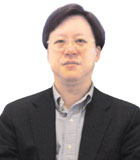![]()
Gear Up | Winning Words
Broaden Your Network | Learners' Light | Enrich Your Readings
On Education
On Education - Interviews with professors and department heads cover the hottest courses available at the eight higher education institutions and the resulting career opportunities.
|
A broader outlook on business
by Edward Chung
If you want to excel in a career in the business community, in this day and age it is important to develop a broad business base during your undergraduate studies. With this in mind, The Chinese University of Hong Kong (CUHK)'s full-time bachelor degree in Integrated Business Administration (IBBA) incorporates training that not only ranges from general skills to specialised subjects such as human resources (HR) and marketing but also gives students a feel for the rapidly changing world of commerce. Today, employers are looking for graduates who are able to adapt to different work environments and think creatively. "Back in the early 1980s, the emphasis was on cramming different topics such as accounting or international finance into the degree," recalls Dr Gordon Cheung, associate dean at the CUHK's Faculty of Business Administration. "The modern business climate now requires young executives who can adapt and have a broad business sense." To meet this need, in 1986 the faculty made the decision to integrate six major programmes into the IBBA programme for young executives wishing to pursue business knowledge in both breadth and depth. Dr Cheung feels that this change has helped keep the degree relevant in a rapidly changing business world. "The IBBA programme has a very wide appeal," he says. "It offers a flexible course of study, which allows students to express their creative and lateral thinking abilities. Consequently, graduates are generally welcomed into a wide range of jobs." The onus is on giving graduates a well-rounded business education, which he explains will help them make sound decisions in their future careers. "For the first year of the degree, students pick up skills, experience and an overall taste for each of the specific functional areas, such as HR, accounting and marketing." "During the second and third years of the degree, students can take specialisations, choosing their 'concentrations' from topics such as finance, marketing, international business or HR. We operate this system because students joining us from secondary school might only have a vague idea about what each of these subjects actually entails and so cannot make a proper value-based judgment on whether they want to specialise in it before applying." Training for business Naturally, most graduates wind up in commercial ventures, with about 70 percent joining private firms, although as many as 20 percent join government departments, trade bodies or non-profit-making organisations. "For those planning on joining the private sector, 'business sense' really is more important than specific training," says Dr Cheung. "Taking an IBBA gives students comprehensive exposure to the entire spectrum of business administration, which they will probably not get from a non-business-related degree." Although the IBBA provides training for the business arena, Dr Cheung points out that today the emphasis is not so much on narrow and de-contextualised specialisation, but rather on fostering conceptual, problem-solving, decision-making and interpersonal skills. Indeed, this broad skill-base allows graduates to excel in a wide variety of future careers. A business administration degree has been offered ever since the CUHK's formation in 1963. Only the full-time degree is offered today, however, although a part-time option was previously available. "With the advent of the Open University of Hong Kong, plus the numerous degrees offered by other local and international universities, we felt that the supply was adequate for Hong Kong. Hence, we'd be better off concentrating our resources on our full-time option," explains Dr Cheung, who adds that the IBBA receives a steady number of applications from strong, qualified candidates, indicating that the programme is much sought-after by students.
Taken from Career Times 2003/05/16 |
|||||||
(11-20 of 68)
A booming market
(2003/07/25)
A leader or a follower...
(2003/07/11)
A classical education
(2003/06/27)
Training for an engineered world
(2003/06/13)
In the market for professionalism
(2003/05/30)
A broader outlook on business
(2003/05/16)
Building a career from the ground up
(2003/04/11)
No ordinary language school
(2003/04/04)
The business of learning
(2003/03/28)
Using geography to understand the world
(2003/03/14)
(11-20 of 68)


